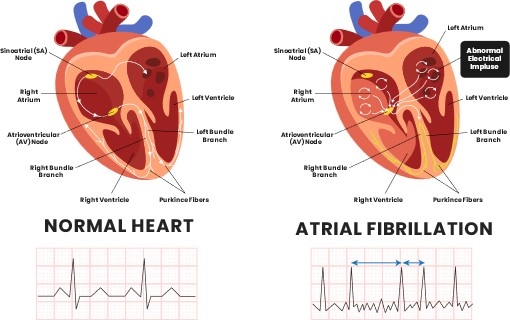Does Atrial Fibrillation (AFib) Go Away?

Does Atrial Fibrillation Go Away?
Atrial fibrillation, or AFib, is one of the most common heart rhythm disorders affecting adults. Cardiovascular Specialists of New England provides expert care and treatment options in New Hampshire to help manage this condition effectively. While some people wonder if AFib can go away on its own, the answer depends on the type and cause of the arrhythmia.
What Is Atrial Fibrillation?
AFib is an irregular and often rapid heartbeat that occurs when the upper chambers of the heart (the atria) beat out of sync with the lower chambers (the ventricles). This can lead to poor blood flow, fatigue, shortness of breath, and increased risk of stroke or heart failure. It may occur occasionally or become a long-term condition, depending on the underlying cause.
Types of Atrial Fibrillation
AFib is categorized into three main types. Each type has different patterns and treatment approaches:
- Paroxysmal AFib – Episodes begin suddenly and stop on their own, usually within a few hours or days.
- Persistent AFib – Lasts longer than seven days and may require medical intervention to restore normal rhythm.
- Permanent AFib – Continuous and cannot be corrected with standard treatments; the focus shifts to symptom management and stroke prevention.

Can AFib Go Away on Its Own?
In some cases of paroxysmal AFib, episodes may resolve without medical help. However, for most people, atrial fibrillation is a chronic condition that requires management to prevent complications. The longer AFib goes untreated, the higher the risk of it becoming persistent or permanent.
Atrial Fibrillation Treatment Options
There are several AFib treatment options depending on the severity and type of AFib. These may include:
- Medications to control heart rate or rhythm and prevent blood clots
- Electrical cardioversion to reset the heart’s rhythm
- Catheter ablation to destroy small areas of heart tissue causing irregular signals
- Lifestyle changes to reduce AFib episodes
Managing Atrial Fibrillation
Managing atrial fibrillation naturally is also important in reducing the frequency and severity of episodes. Patients are often encouraged to make changes such as:
- Reducing alcohol and caffeine intake
- Maintaining a healthy weight
- Controlling high blood pressure and diabetes
- Getting regular physical activity with guidance from a healthcare provider
- Managing stress through relaxation techniques or counseling
Why Choose Cardiovascular Specialists of New England
Cardiovascular Specialists of New England offers comprehensive care for patients with all types of AFib. Our board-certified cardiologists are experienced in diagnosing and treating complex heart rhythm conditions, and we use the latest diagnostic tools and therapies to tailor a plan for each individual. With a patient-centered approach, we help individuals understand whether their AFib can go away and how best to manage it long-term.
Talk to a Heart Rhythm Specialist Today
If you’ve been diagnosed with AFib or are experiencing symptoms, contact Cardiovascular Specialists of New England in New Hampshire to explore your treatment options. We can help you learn how to manage atrial fibrillation and improve your heart health.
Stay Tuned! More information coming soon!
